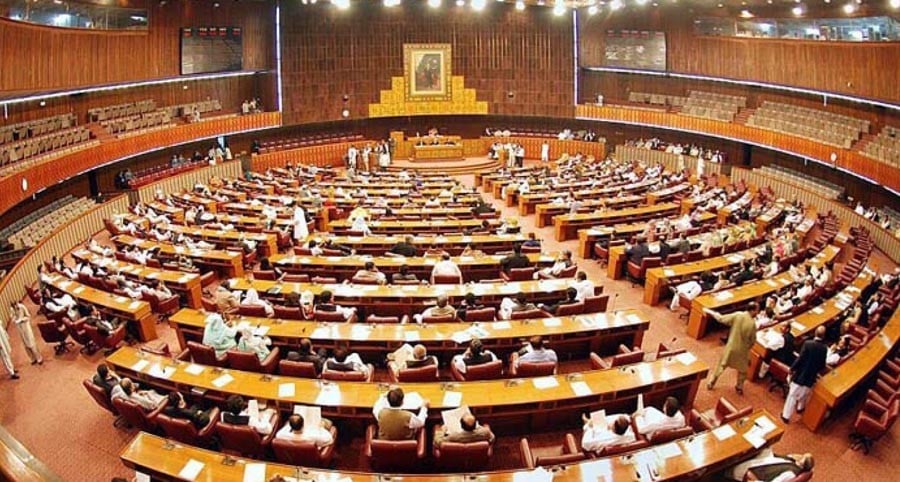
A critical analysis of the parliamentary history of Pakistan

Parliaments have a vital role in establishing and strengthening the basic ethics and principles of democracy. Since democracy has been globally approved as a better system for the betterment of a nation, therefore to run democracy in a congenial atmosphere the structure of parliaments has been introduced in modern political history.
I still remember a sentence of a Norwegian female lecturer at University of Oslo in a debate in 1987 that if their parliament asks them to opt for Islam, without any hesitation they will do the same. I asked her since every individual has her/his own faith, where does the role of parliament come in these matters? She immediately replied, "We trust our parliament to any extent and we believe blindly that our parliament absolutely thinks for our betterment."
If we look into the parliamentary history of Pakistan, it is not very inspiring. The 1956 and 1962 constitutions remind us of the political instability in the country. It is ironical that the 1962 constitution was framed when the country was ruled by a military dictator, General Ayub Khan.
After the 1970 election, we faced a bleak chapter of our political history and the country was disintegrated and Bangladesh emerged as an independent state. Those gloomy days are still fresh in the minds of the masses of Pakistan and one can’t ignore how realities were ignored at that time. After the disintegration of the country, the political system emerged on the basis of the 70s elections where the PPP was having majority in Punjab and Sindh and the JUI and the ANP were in a position to form their governments in Balochistan and the KPK (then NWFP).
Again it is very paradoxical that late Z.A. Bhutto was initially installed as first civil chief martial law administrator as well as president of Pakistan. The political forces of that era tried hard to frame a constitution for the country and finally they succeeded to give a unanimous constitution to the nation in 1973.
But in 1977, another military dictator, General Ziaul Haq, abrogated the constitution and took over the reign of the country. His regime lasted for about 10 years and during his unconstitutional rule, the concept of a non-party election was introduced. During his era, the parliament was just a tool for legalising his wishes.
The history of parliaments in Pakistan has not yet developed people’s blank confidence in these democratic institutions. The parliaments have always been used to indemnify the acts of military dictators and couldn’t establish better democratic traditions in line with the aspirations of the people of Pakistan.
Again when Musharraf took over, innumerable legislators from different political parties were impatient to support him and the Convention Muslim League, the Pakistan Muslim League-Q, the MQM, the PPP-Patriot and other political parties supported him. When the General Musharraf’s period was over, the PPP again came into power and, being a claimant of democratic struggle, it didn’t bother to take any initiative against General Musharraf under Article 6.
Every government derives its power from the parliament. But again the parliament in those days merely exercised its routine business and the parliamentarians were busy in fulfilling only the requirements of parliamentary calendar, rather to uphold the hopes and wishes of the people of Pakistan.
The present parliament has merely become a debating club and a place of unethical exchange of remarks among the parliamentarians. Here we observe a persistent lack of quorum and it appears that the people who are sent for legislation and addressing the national issues do not bother about their duties. This is the first parliament in the history of Pakistan which does not have a foreign minister. Although it was the government’s duty to appoint a foreign minister, the parliament also felt easy without having a foreign minister.
Since Senate and National Assembly both constitute the structure of parliament, our Chairman Senate always speaks highly of democracy and nowadays stressing for a grand national dialogue. One really feels astonished that the masses have performed their duty by sending the parliamentarians to these two houses and now it is the duty of parliamentary groups to exercise their wisdom for the national development rather to create chaos and utopian concepts about national issues.
If the present parliament had shown any genuine concern to the national issues, Pakistan would not have been facing the present national crises and geopolitical threats. If we remember the recent process of electing new prime minister, the ruling party’s parliamentarians entered the assembly hall taking pictures of a disqualified prime minister that showed how supportive they were of his ideologies, thus completely rejecting the decisions of Supreme Court of Pakistan.
Though Pakistan has seen dozens of prime ministers and four military rulers, we are still in an embryonic stage regarding democracy. In democratic countries and ethically established societies people follow the role and character of their representatives sitting in the parliament and the legislators are morally bound to behave with high sense of responsibility and establish high standard of democratic norms and traditions.
In Britain, Margaret Thatcher, John Major, Tony Blair, Gordon Brown and David Cameron did not own the British government as their family empire and the same is the case with India, Iran etc whose leaders are not having a property of a single room in Britain. The people of Pakistan are very rightly justified to ask their representatives sitting in both the houses of Parliament that what is their progress so far in terms of the eradication of corruption and malpractices in various institutions of the country.